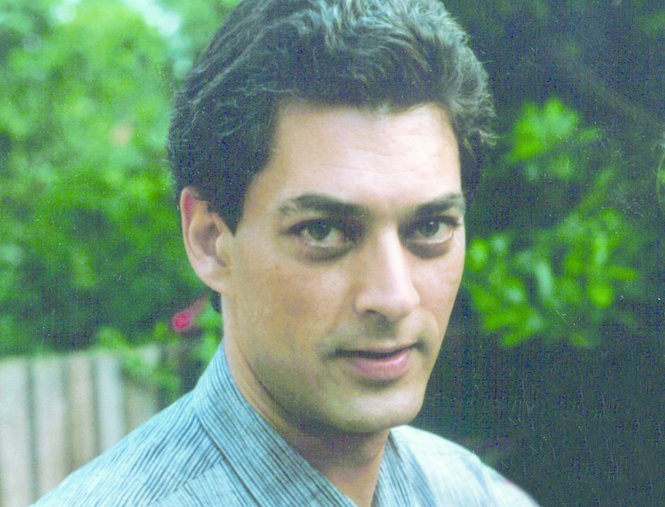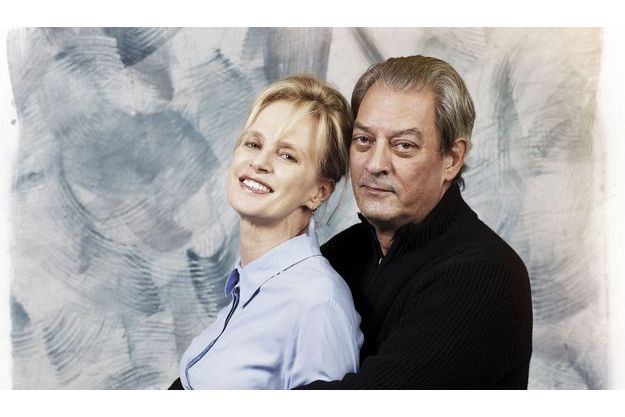Winter Journal by Paul Auster
Before starting Winter Journal, the first of my 20 Books of Summer, I tried really hard to clear the decks and finish off all the physical and ebooks I was reading prior to June 3. But books are meant to be in e with each other, as the saying goes, and so I found myself in the middle of listening to How to be Alone by Jonathan Franzen when it was time to start Winter Journal, and did they ever have a conversation.
I vaguely knew that Paul Auster and Jonathan Frazen had a few things in common. They both live in New York (at least part time), they are both married to writers, they are both Baby Boomers. They’re both critically acclaimed, commercially successful novelists, though they are on rather different ends of the spectrum when it comes to being controversial (“name” + “controversy” brings up no relevant results for Mr. Auster, Mr. Frazen’s results reference at least five separate incidents on the first page.)


Portraits of the artists as young men
Even so, I didn’t expect these books to be drawing from such similar circumstances and emotions. Both books are driven by grief, specifically, the loss of parents. In Auster’s case, death is quick and unexpected, while Franzen’s parents get sick and linger, but I was struck but how both men end up suffering extreme physical reactions – hives, panic attacks – when they can’t or won’t express their grief any other way. And how vulnerable they get in these books, challenging the traditional masculine response to grief.
Comparing these books at all is not really fair. Franzen’s book is a collection of essays, many written for The New Yorker or other magazines, in the nineties and early aughts, before he was famous (or forty). Auster’s book is just what it says on the tin, a journal, addressed to himself, written just before and after his 64th birthday and stretching back over his whole life.
Your bare feet on the cold floor as you climb out of bed and walk to the window. You are six years old. Outside, snow if falling, and the branches of the trees in the backyard are turning white
Winter Journal
So Winter Journal necessarily is a more coherent piece of writing, and it’s much more experimental in form, more of a study of the body than of the words or thoughts.
A catalogue of sensory data. What one might call a phenomenology of breathing.
Winter Journal
You know how people say they’d read anything by their favourite author, even a grocery list? Winter Journal gets pretty close to that territory. We get a list of all 21 of his permanent addresses, mostly in New Jersey, New York, Paris (only the latest address is lacking an exact street and house number). We get detailed plot summaries of old movies he watches on TMC. An approximate number of trips to various vacation spots. A detailed accounting of his romantic and sexual relationships, the girlfriends (and prostitutes) named, the wives not (because we know that the disastrous first marriage was to Lydia Davis, and the deliriously happy second to Siri Hustvedt). Childhood obsessions, illnesses, injuries. His mother looming large over all of it:
There were three of her, three separate women who seemed unconnected to one another, and as you grew older and began to look at her differently, to see her as someone who was not just your mother, you never knew which mask she would be wearing on any given day. At one end, there was the diva, the sumptuously decked-out charmer…In the middle, which was far and away the largest space she occupied, there was a solid and responsible being, a person of intelligence and compassion, the woman who took care of you when you were young… At the other end, the extreme end of who she was, there was a frightened and debilitated neurotic, the helpless creature prey to blistering assaults of anxiety…In other words: afraid to die, which in the end is probably no different from saying: afraid to live.
Winter Journal
After his mother dies, Auster suffers his first panic attack, and in a story of a body and its sensations, it’s the centre piece, the moment it all starts to go wrong: he goes on to suffer a suspected heart attack, a traumatic car crash, and the more common indignities of old age. I’ve never read a memoir like this, and though focused on the physical, it’s a fully emotional experience.
Meanwhile, Franzen opens and closes his collection with essays about the death of his father (“My Father’s Brain”) and his mother (“Meet Me in St. Louis”) and, while presumably hemmed in by certain stylistic conventions and word counts of The New Yorker, these essays were the most emotional and vulnerable pieces of his I’ve read (and I’ve read quite a few). His father’s dementia progresses over years, undiagnosed, chalked up to “nervousness & depression” in his mother’s increasingly frantic letters. Like Auster, Franzen is forced to consider his father differently:
I’m struck, above all, by the apparent persistence of his will… One of the stories I’ve come to tell, then, as I try to forgive myself for my long blindness to his condition, is that he was bent on concealing that condition and, for a remarkably long time, retained the strength of character to bring it off.
“My Father’s Brain”
Though I am fascinated by his public persona, and find him observant and often hilarious, I’ve never thought of Franzen as one of my favourite writers, because his novels can be a bit clinical and cold. I need that emotional gut punch to get really invested, and with this essay, I finally got it, in his recounting of letters and nursing home visits, of finding evidence that his father struggled with memory loss for far longer than anyone knew. I was sobbing by the end.

Then, at the end of the collection, it happened again. Meet Me In St. Louis is ostensibly about the Oprah unpleasantness but it is actually Franzen’s inability to go home, literally. Oprah’s producers want to film him traipsing around his old neighbourhood, even want him to go into his childhood home, for b-roll footage that never aired (see: unpleasantness) and he won’t do it. He plays the absurdity up for laughs, but in being forced consider that old house, he recalls the last time he was in it, cleaning it out after his mother’s death:
The distant past may live only in my head, and my memories of it may merely be mocked by the sterile present, but there are much more recent and much more painful memories that I’ve tried to leave behind me in the house. For example, there’s the little Pyrex dish of canned peas that I found in the refrigerator… I was ambushed and nearly destroyed by this dish of peas. I was forced to imagine my mother alone in the house and willing herself to eat a bite of something, anything, a bite of peas, and finding herself unable to. With her usual frugality and optimism, she’d put both the can and the dish in the refrigerator, in case her appetite ever returned.
“Meet Me in St. Louis”
Franzen breaks out in hives during all this and acknowledges that the only way he got through his mother’s death in the first place was to promise himself he’d never come back.

In both books, some stories rang false, or might be better left untold. Auster on race is a little cringey (on being mistaken for Italian, Greek, Spanish, and more: “you long ago decided to presume that you are a composite of all the races of the Eastern Hemisphere… it is a moral position, a way of eliminating the question of race, which is a bogus question in your opinion, a question that can only bring dishonor to the person who asks it”), and he’s rhapsodic to the point of banality about his second wife, not insincere, just boring, in the way that all happy families are. He remarks on his wife’s “long and slender” neck, “the very emblem of her extraordinary beauty”, laying it on a little thick, though I must concede she does have a very nice neck:

Franzen is eerily prescient on the evils of the Internet, managing to rail against social media years before anyone said “Web 2.0”, but he can be a bit of a crank (have you heard?) when it comes to much more benign technology. I thought the essay “Scavenging”, centered on his unwillingness to give up his rotary phone, might be parody, and I’m still not sure. Typewriters, televisions, “Nokias and Startacs” all get the “get off my lawn” treatment from a man in his mid-thirties, already sick of so much.
Your mileage may vary on these books. Auster’s style here probably isn’t for everyone, and if you’re a Franzen hater, you may not find much to change your mind here. But I’m glad I read them, and that I happened to read them together. Auster writes the body and Franzen writes the brain, but both write with a lot of heart.
This is the first of my 2019 20 Books of Summer reviews. Keep track of them all here.
I have read a lot of earlier Auster, and this prompts me to go back to look at some of his more recent work.
He’s still got it! 🙂
I’ve read only one Auster and wasn’t that enamoured but have not tried Franzen. Would this be a good one to test the water?
Noooo I think not! Read The Corrections first.
I’ve still not tried Auster (have read several Hustvedt novels instead), but this may be the summer that I finally do — I picked up a free copy of Timbuktu while I was in the States, which is narrated by a dog so fits with my challenge of all animal books for my 20 Books of Summer. That photo of Auster and Hustvedt is hilarious! Did you know their daughter is a singer/actress?
Yes, I came across her in my research. She’s so gorgeous! Got a Hustvedt recommendation? I read a book review she did for the NYT recently and really liked her style!
The Blazing World or What I Loved.
Auster is my favourite author – so I’d read a grocery list by him. He does like a good list, 4321 is full of them! I read this when it was first published, and can’t remember too much about it, so thanks for reminding me.
Yes, there are SO many parallels between this and 4321 (so far, the only work of his I’ve read). I would also read his grocery lists at this point 🙂
This is a very clever little piece, what a great idea to compare the two! Both men have never really appealed to me, but I’ll read their books for what it’s worth. Are they both a bit snobby then? That’s the vibe I’m getting. Also-breaking out in hives after a parent’s death but not being able to cry? Of course a man would do that, so dramatic!
Franzen, yeah, he is (but I still love him). Auster… probably is too, but isn’t so obvious about it. I mean, he started out his writing career by translating French poetry. But he seems a lot more down to earth. They are both great writers though, so!!